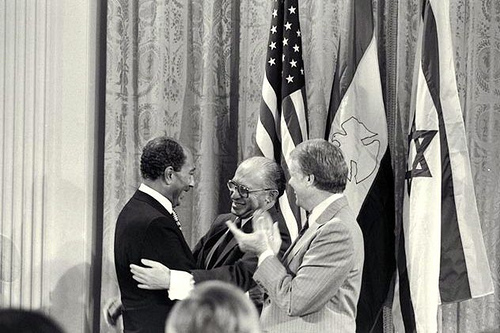

Jimmy Carter recently made news by traveling to Palestine two weeks before a U.S. presidential election and berating Israeli Prime Minister Benjamin Netanyahu and Barack Obama, an American president of his own party, for—despite their rhetoric to the contrary—virtually abandoning the “two-state solution” for peace to the Israeli-Palestinian conflict. Carter additionally criticized President Obama because “the United States used to be [the] major obstacle to Israeli expansion [in the West Bank]—now the United States is quite dormant.”
Although Jimmy Carter is probably the president since the 1920s with the most libertarian tendencies (many libertarians might be shocked at this unpalatable conclusion, but they should closely examine the policy record), he has regrettably never been very libertarian toward the Middle East. Carter (like most pundits) has regarded his brokerage of the Camp David Peace Accords to create a lasting peace between Israel and Egypt as his most notable accomplishment. (Carter touts this episode excessively and is actually too modest about his other achievements as president, which is probably one major reason why most people are unaware that he had any.) Like any politician, Carter is jacking up the rhetoric to get publicity during a presidential election for this embattled legacy. He undoubtedly fears that the continued Israeli-Palestinian stalemate and an Islamist Egypt that is less friendly toward Israel and his Camp David Peace Accords threaten his most cherished and praised triumph.
Carter said that Netanyahu lacked the courage of previous Israeli prime ministers and that he had abandoned the two-state solution that had been the accepted framework for resolving the Israeli-Palestinian conflict for decades. But therein lies the problem. Despite decades of American efforts under many presidents to pressure Israel to reach such a solution with the Palestinians and give back land stolen at gunpoint, it hasn’t happened. U.S. presidents, including George W. Bush and Barack Obama, have been sucked into this continuing mire and spit out bleeding. Obama is therefore right—as George W. Bush was—to be leery of an issue that has burned him badly.
And even the positive effects of Carter’s prized Camp David Accords should be questioned. It is always nice when the United States can help warring parties make peace—for example, George W. Bush’s efforts to end the Sudanese civil war—but a difference exists between mediating negotiations between two exhausted parties that want to end a bloody war, as was the case in Sudan, and paying hefty bribes to two countries to do what was in their best interest to do in the first place. Since 1978, the United States has bribed Israel and Egypt with more than $150 billion in military and economic aid to keep their peace.
Because Israel gets substantially more of this U.S. aid than Egypt, Carter contributed greatly to the problem he now deplores—Israeli intransigence about giving back West Bank land and creating a viable Palestinian state. The effect of all of this aid, and thus enhanced U.S. backing of Israel since 1978, has made the Israelis more prone to further settle—against international law—land that is militarily occupied, rather than negotiating it away for a lasting peace. Therefore, the question should be asked: Does slathering Israel with money and diplomatic and military support actually help the country in the long term? The answer is, of course, no.
Thus, contrary to Carter’s criticism, President Obama has been wise to distance himself from the Israeli-Palestinian peace process. He has done so recently to court Jewish voters in a tight election, but he had already found that rhetorically browbeating the Israelis didn’t really get anywhere. If Obama wins a second term, he will probably be dragged back into the Palestine bog—and so would Mitt Romney if he were instead elected. Either man should resist because the Israeli-Palestinian peace issue doesn’t really affect U.S. vital interests (and if you believe Middle East oil is strategic, which is dubious economics, slavish support for Israel makes even less sense), and neither the Israelis nor the Palestinians are yet ready to solve the problem. But if the future president really wanted to see some movement by Israel toward resuscitating the two-state solution, he would take the courageous step of ending the embarrassing U.S. aid to a now wealthy and intransigent country. To be fair, the much smaller amount of aid to the Palestinians should also be ended. But alas, neither a President Obama nor a President Romney will be likely to take these politically costly steps.
The views expressed in this article are the author’s and do not necessarily reflect those of MuslimVillage.com.



